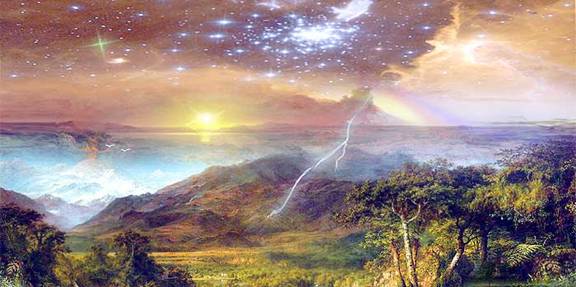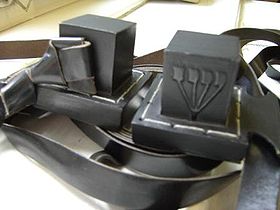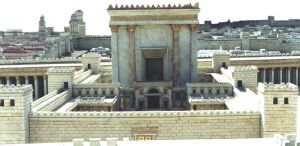Parashat Bereishit

The story of Adam and Eve’s eating of the forbidden fruit, a major topic in this week’s Torah portion, Bereishis, is perhaps the most famous of Biblical stories. Warned by G-d to refrain from eating fruit from the Tree of Knowledge that is in the midst of the Garden of Eden
Parashat Bereishit

The story of Adam and Eve’s eating of the forbidden fruit, a major topic in this week’s Torah portion, Bereishis, is perhaps the most famous of Biblical stories. Warned by G-d to refrain from eating fruit from the Tree of Knowledge that is in the midst of the Garden of Eden, the two ignore His command and sin. That they could have acted that way is a great puzzle, for before they ate of the tree, evil was not a part of their psychological makeup, making it difficult to understand how they could disobey the All-Mighty. While the text makes it clear that the tree was quite attractive, it is still difficult to believe that such an enticement would lead Adam and Eve, at the time beings pure of sin, beings having no shame of their own nakedness, to transgress.
While the snake certainly brought the tree to Eve’s attention, there is no sense that his essential message was believed. The snake’s claim that “on the day you eat of it your eyes will be opened and you will be like G-d, knowing good and evil” is not what drives Adam and Eve to eat of the forbidden fruit. The narrative makes clear that to Eve the tree appeared “good to eat, desirable to look at, and a pleasant means to acquire wisdom”. There is no mention here of her or Adam seeing the tree as a vehicle to become G-d’s equal, rather it is a higher level of wisdom that they ultimately seek.
The Madregat Adam, a great 19th century Mussar (ethical) leader, offers a widely accepted interpretation of the whole incident. He says that Adam and Eve never intended to revolt against G-d, quite the contrary, they saw their eating of the tree’s fruit as a means to elevate themselves to a higher level of service to G-d. Realizing that the yetzer hara, the evil inclination, was not a part of their psychological makeup they felt flawed in their ability to serve G-d in as lofty a manner as possible. Service of G-d is most significantly exemplified when one faces a test, a conflict, and acts as the All-Mighty would have one act. For Adam and Eve there were no such challenges, for they lacked a desire internally to do anything against G-d’s will. Their eating of the tree would allow them, for the first time, to feel the internal tug of war between the yetzer hara and the yetzer hatov, the desire to do good. Facing and overcoming such a challenge would show them to be even more loyal servants of G-d.
What the two failed to realize, however, was that they would be creating conflicts and challenges for themselves that they would not be able to overcome. While they intended to create tests to better show their loyalty to the All-Mighty, these tests proved to be their downfall. In the view of the Madregat Adam, then, the sin of Adam and Eve was not so much their disobeying the All-Mighty as their failure to appreciate the depth of G-d’s understanding of their very being.
G-d’s commandments should have been respected by them not just because they were reflective of His will but also because the Creator had the greatest understanding of who they were and what they were and were not capable of accomplishing. Abandoning the parameters laid down by their Maker, the One who truly understood them, could only bring unfortunate circumstances. Today too, we hearken to G-d’s commands not only because they are expressions of His will but also because we know following them will be best for us.
In the midst of this parsha rich with the Creation narrative and the story of the Garden of Eden, we read the story of Cain and Abel. Incredibly concise, measuring all of 8 (!) sentences in length, from the birth of Abel to his death, the story is one of the most famous in literature.
Many elements of the story, though, have gone fairly unremarked. One example of this is the matter of the brothers’ names. As in many cases in the Bible, we are provided with an insight into a character’s inner being by simply studying his or her name. The name Cain is derived from the Hebrew word, kone which means to acquire. Abel, on the other hand comes from hevel, which means breath. While Cain is a tiller of the soil, intent on acquiring greater and greater wealth, Abel shows no such inclination, preferring to be a shepherd, content to wander with his flocks and just breathe the fresh air.
In the story’s beginning, we are told how they brought offerings to the All-Mighty. Though Cain is the one who deserves credit for originating the idea of bringing these offerings it is, paradoxically the offerings of Abel that find favor in the All-Mighty’s sight. This is because, as the commentaries note, the offering Cain brings is not of the best of his produce, while Abel brings the best of his flock. Cain is most upset, though, at this unwelcome result, and begins to harbor ill will against his sibling. His behaving this way raises questions as to what his intent was in in the first place when he brought his offerings. Were his offerings an expression of thanks to the All-Mighty for all that he received or a cynical, manipulative attempt to get G-d to give him more wealth? The All-Mighty’s subsequent conversation with Cain favors the latter interpretation for G-d tells him, ‘If you do well, you will be uplifted, and if you don’t do well sin crouches at the door.”
One would hope that, having been given a warning by the All-Mighty himself, Cain would find it in his heart to abandon his lust for greater and greater wealth. Such was not to be the case, however. When the two go out to the field, Cain says something to Abel, provoking a confrontation in which Abel is ultimately murdered – in a most horrific fashion.
The Bible is silent as to what was discussed in this tragedy inducing conversation between the brothers. The midrash, however, offers a number of possibilities. In several midrashim, the brothers are said to have argued about the division of the world’s wealth between them. Another midrash, however, has them arguing about a woman, while still another has them arguing as to on whose ground should be the Holy Temple. Unwilling to settle the affair peacefully, the two fought and Abel was murdered.
An alternative suggestion though has been offered about the Torah’s silence on the brothers’ discussion. According to this view, the Torah is silent on what they talked about because the subject of their argument simply did not matter. Jealous at his brother’s seeming closeness to G-d, too absorbed in his own wants to appreciate that he could learn from and not simply compete with his sibling, Cain was just looking for an excuse to provoke conflict. Too often, when people argue, they make the mistake of thinking that it is what they are arguing about that is the problem, instead of their own self-centered natures. The Biblical message here is that better one look at oneself and try to do good, lest sin crouch at the door.
To end off, one of the most profound verses in the whole Torah is in this week’s sedra: “And G-d created man in His own image.” Since G-d does not have a physical being, this means that we are endowed with free-will, morality, reason and the ability to emulate G-d Who bestows kindness. Also, if we really appreciate that we are created in the image of G-d, we realize that we have intrinsic worth. Therefore, there is no need to be depressed wondering if you have intrinsic worth!
Have a Simcha-filled Simchat Torah!!!!
SHABBAT SHALOM





